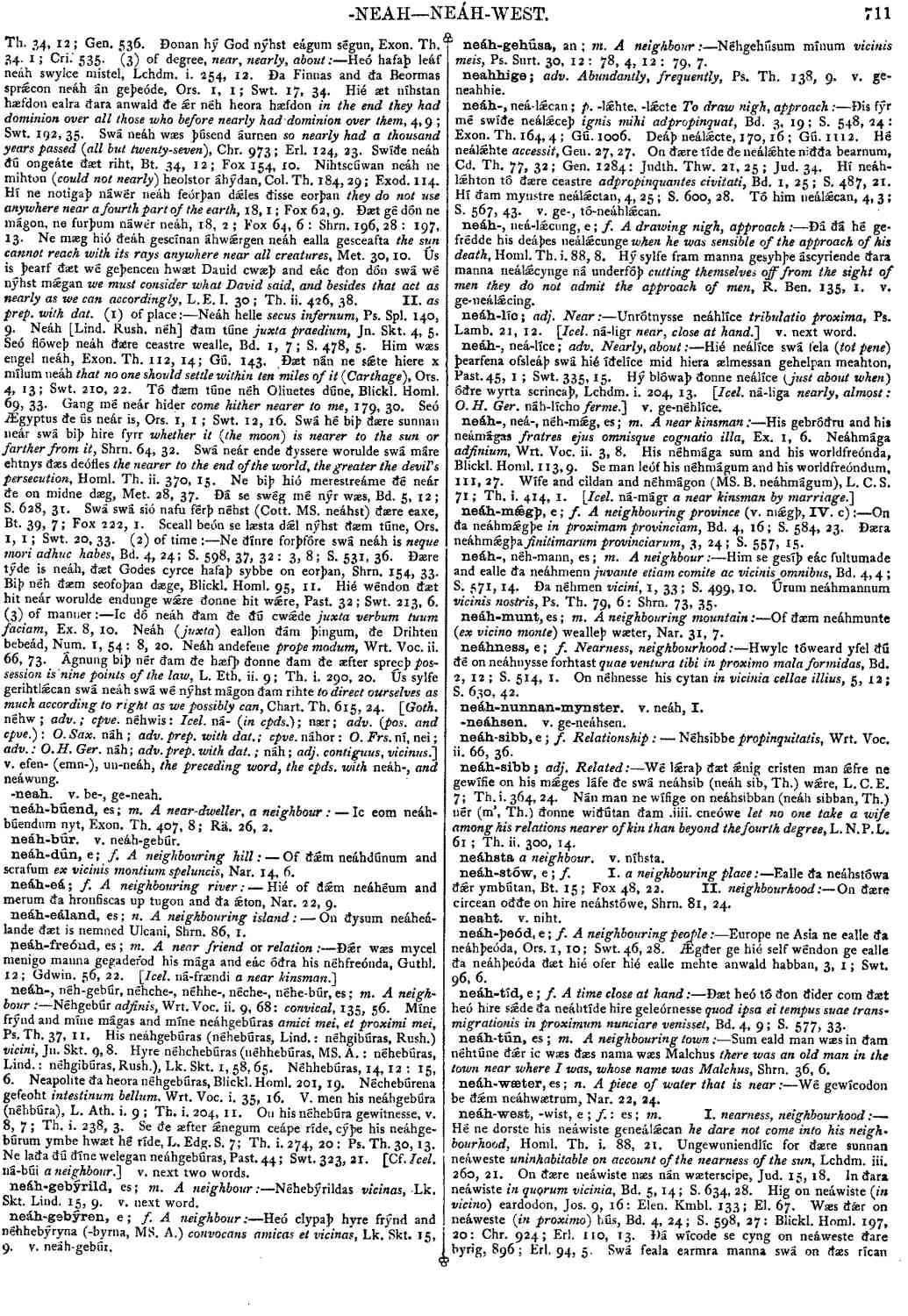neáh-west
- noun [ masculinefeminine ]
-
Hé ne dorste his neáwiste geneálǽcan
he dare not come into his neighbourhood,
- Homl. Th. i. 88, 21.
-
Ungewuniendlíc for ðære sunnan neáweste
uninhabitable on account of the nearness of the sun,
- Lchdm. iii. 260, 21.
-
On ðære neáwiste næs nán wæterscipe,
- Jud. 15, 18.
-
In ðara neáwiste
in quorum vicinia,
- Bd. 5, 14 ;
- S. 634, 28.
-
Hig on neáwiste (
in vicino
)eardodon,
- Jos. 9, 16: Elen. Kmbl. 133 ;
- El. 67.
-
Wæs ðǽr on neáweste (
in proximo
)hús,
- Bd. 4, 24 ;
- S. 598, 27 : Blickl. Homl. 197, 20: Chr. 924 ;
- Erl. 110, 13.
-
Ðá wícode se cyng on neáweste ðare byrig,
- 896 ;
- Erl. 94, 5.
-
Swá feala earmra manna swá on ðæs rícanneáweste sweltaþ,
- Blickl. Homl. 53, 5.
-
Ða ðe on hire neáwiste lifgeaþ,
- 43, 2.
-
Ne [mágon] húse ðínum on neáweste náhwǽr sceþþan
flagella non appropiabunt tabernaculo tuo,
- Ps. Th. 90, 10.
-
Ealle ða wǽpnedmen ðe him on neáweste wǽron,
- Ors. 1, 10 ;
- Swt. 46, 2.
-
Ealle ða rícu ðe him under beóþ oððe on neáweste,
- Bt. 16, 1 ;
- Fox 50, 3.
-
Tó ðæs ríces neáwiste belimpeþ seó stów
ad cujus vicina pertinet locus ille,
- Bd. 5, 12 ;
- S. 630, 22.
-
Hwæt is betere ðonne ðæs cyninges folgaþ and his neáwest (cf. ðæs cyninges geférrǽden, l. 2)
what is better than to serve and be with the king ?
- Bt. 29, 1 ;
- Fox 102, 7.
-
Hwelc is ǽngum men máre daru ðonne hé hæbbe on his geférrǽdenne and on his néweste feónd on freóndes anlícnesse,
- 29, 2 ;
- Fox 106, 14.
-
Þincþ his neáwist (
the presence of the dead body
)láþlíco and unfæger,
- Blickl. Homl. 111, 30.
-
Ne cume he ná on ðæs cyninges neáwiste (ansýne, MS. H.),
- L. Edm. E. 3 ;
- Th. i. 246, 3.
-
Se sacerd démde ðæt hé sceolde beón áscyred fram manna neáwiste
the priest judged that he (the leper) should be separated from the society of men,
- Homl. Th. i. 124, 25.
-
Hé férde tó folces neáwiste and bodade,
- 352, 11.
-
From alre néweste geleáfulra sýn heó ásceádene,
- Chart. Th. 29, 19.
-
Mid ðý ic wæs him on neáwiste, hé ðus wæs sprecende,
- Bd. 3, 13 ;
- S. 538, 23.
-
Forlǽt mec englas geniman on ðínne neáwest (
into thy presence
),- Exon. Th. 455, 13 ;
- Hy. 4, 49.
-
Ic forboden ǽlcon bisceope and mæssepreóste ðæt hig nánes wífmannes neáweste mid him næbbon (
ne mulieris alicujus societatem secum habeant
),- L. Ecg. P. ii. 6 ;
- Th. ii. 198, 8.
-
Wé lǽraþ ðæt ǽnig preóst ne lufige wífmanna neáwiste,
- L. Edg. c. 60 ;
- Th. ii. 256, 21.
-
Hí wífes neáwiste forléton,
- L. Ælfc. C. 1 ;
- Th. ii. 342, 14 : Homl. Skt. 10, 204.
-
Libia and Agrippina wurdon swá gelýfede ðæt hí forbugon heora wera neáwiste,
- Homl. Th. i. 374, 33.
-
Ne can ðara idesa ówðer þurh gebedscipe beorna neáwist,
- Cd. Th. 148, 36 ;
- Gen. 2467.
Bosworth, Joseph. “neáh-west.” In An Anglo-Saxon Dictionary Online, edited by Thomas Northcote Toller, Christ Sean, and Ondřej Tichy. Prague: Faculty of Arts, Charles University, 2014. https://bosworthtoller.com/23500.
Checked: 1